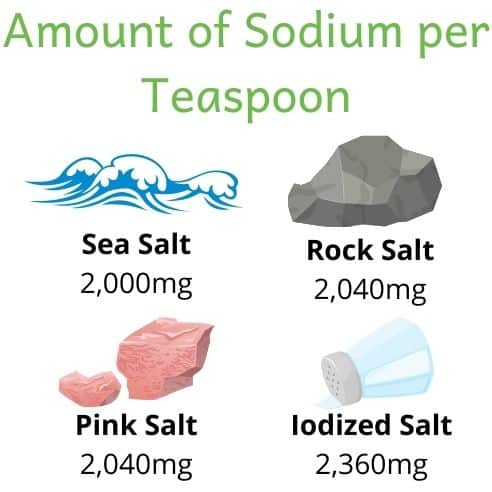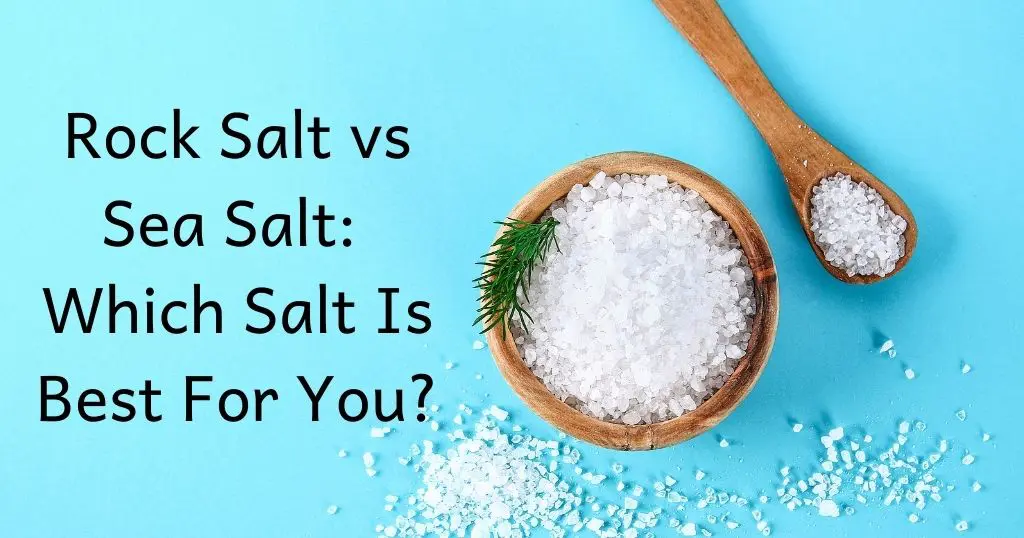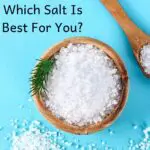There are many different types of salt available these days. Which is better: rock salt vs sea salt? Read on to understand the differences between salts and if one type of salt better than another.
Table of Contents
What Is Rock Salt?
Rock salt (also known as halite) is primarily sodium chloride. Rock salt is mined from salt rocks that have formed naturally, usually near the ocean, or other salty bodies of water. Although, some rock salt is mined from locations not near salt water. Essentially, rock salt is salt originally from the ocean that has solidified into a rock.
Rock salt is often used for icy roads, to make ice cream and for water softeners.
What Is Sea Salt?
Sea salt is exactly what it sounds like – salt from the sea! Sea salt is “harvested” by letting sea water evaporate. The grains that are leftover are sea salt.
Rock Salt vs Sea Salt
Is rock salt the same as sea salt? Yes! Nutritionally and chemically, rock salt and sea salt are basically the same!
The difference is how the salt is gathered. Rock salt is simply salt from the ocean that has already formed a rock. Whereas sea salt is salt from the ocean after the water evaporates.
Both rock salt and sea salt are usually sold in a more coarse grain, compared to regular iodized salt. This coarse texture can be a nice touch from a culinary perspective when you want to add salt on top of a baked good, or even add a bit of crunch or texture!
Both rock salt and sea salt contain very small amounts of minerals such as zinc, copper, iron, manganese, potassium, calcium and copper. (1) However, the amount of these minerals you get from either rock or sea salt is minimal. These minerals do not necessarily make rock or sea salt better for you.
Regular, iodized salt is made from salt harvested from mines or ocean water too! However, these trace minerals and elements are removed. Regular table (or iodized) salt is more “purely” sodium chloride.

Salt is Salt
Salt is salt. Period. Any kind of salt, whether it be sea salt, rock salt, or any other kind of salt on the market, provides a significant amount of sodium. Some salts contain slightly less sodium than regular salt, but this difference is miniscule and likely won’t make a big difference in the long run.
Different kinds of salt:
- Rock Salt
- Sea Salt
- Iodized Salt
- Himalayan Pink Salt
- Kosher Salt
- Celtic Salt
- Black Salt
- Fleur-de-sel
No one of these salts is better for you than another. Although there are differences in taste and culinary use, all of them contain about the same amount of sodium.
Salt & Health
Salt and sodium is an important part of our diet. Our bodies need sodium to keep water where it should be in our body. Sodium is also important to help our nerves and muscles work correctly.
However, most of us are eating much more salt than we need. (2) Eating too much salt increases your risk of high blood pressure, heart disease, kidney disease, stroke, osteoporosis and kidney stones.
How Much Salt Do We Need?
The Dietary Guidelines for Americans recommends that everyone limit sodium to 2,300mg per day. The average person in the United States consumes closer to 3,500mg each day. (2)
One teaspoon of salt, whether it be rock salt, sea salt, or any other kind of salt, has about 2,300mg of sodium.

However, this doesn’t mean we should add a whole teaspoon of salt to our food each day. It is very important to know how much salt is already in the foods we eat. About 80% of the salt we eat is already in food.
Common high salt foods:
- Soups
- Sauces & salad dressing
- Condiments like ketchup, barbecue, soy sauce or hot sauce
- Lunchmeat and other processed meats like bacon, sausage, hot dogs and bologna
- Deep fried breaded foods
- Restaurant and fast foods
- Salty snacks like chips, pretzels, salted nuts and crackers
- Processed cheeses like American or nacho cheese sauce
Always check the Nutrition Facts label to see how much sodium is in the foods you eat.
Can I Add Salt With a Low Sodium Diet?
Yes! You can absolutely add a little salt to your food if most food you eat is cooked at home using fresh, low sodium ingredients.
However, just a pinch will do!
Salt Substitutes
You can buy “low sodium” salt or “salt substitutes” to use instead of salt. These products are a great way to bring out the flavor in your food without all the sodium.
However, many salt substitutes are made from potassium chloride. Potassium chloride has a very large amount of potassium. This could be dangerous for some people with kidney disease.
Rock Salt vs Sea Salt: The Verdict
Neither rock salt nor sea salt are better for you than regular salt. Use whatever kind of salt you choose sparingly.
Happy Eating!
Melanie



Ive been using a salt substitute. Its called “green salt”. any opinions?
This may be a good option! I need to know more about you and your medical history to say for sure.
Please list all the vegetables that is good when you have chronic kidney disease B
Hello! ALL vegetables are good when you have chronic kidney disease. The key is learning how to build a healthy meal pattern – which is different for every single person with kidney disease.
Of all the salts you’ve mentioned, I’ve heard and read that Celtic salt is the best one for you because it contains many more minerals than any other salt.
Truly, the amount of minerals you’d get from ANY salt are minimal and not of any amount that would influence nutrition status in any way – unless you were consuming dangerously high amounts of sodium. So really, it is a wash!
tabular form mineral content comparison of all salts,would have been quite useful.
Again – the amount of minerals you realistically get from ANY salt is SO small, it wouldn’t contribute significantly or in any meaningful way to health. Unless you were consuming incredibly high and dangerous amount of salt.
I would challenge this statement. That’s like saying all water is created equal…
All water is created equal.
I think it is important to “see” and sometimes to “feel” the salt you eat. Same as with fats like butter. If you boil potatoes with half a teaspoon salt and mash them with 2 tablespoons of butter and serve them all dissolved and mix, they do not taste as good as if you boil them in plain water and mash them and serve them with a pat of butter, maybe 2 teaspoons, and a few pinches of salt them just taste better i.e. salty and buttery! You have to see the butter melting and dripping and feel the salt crystals on your tongue. Kosher salt is good for this. Think of eating pretzels and how you feel and see the salt before you actually taste it.
I absolutely agree there are different culinary uses of different types of salt!
I notice a lot of commercial breads have soybean oil in them. will this ingredient affect a kidney stone?
Nope!
Rock salt is better for you than sea salt. The salt is produced from evaporated salt water and the problem with that is micro plastics. You can definitely end up ingesting micro plastics from sea salt but not from rock salt.
Any idea how much microplastic you actually get from the amount of sea salt you would realistically consume? Is there any data to suggest that amount has negative health consequences?
Isn’t it true that rock salt (from the sea as it was millions of years ago) generally has fewer contaminants – heavy metals, etc – than sea salt derived from modern seas?
Not that I am aware of. Even if it did, the amount of these metals you would be getting from a reasonable sodium consumption would be minimal.
Ok. I guess the heavy metals don’t “build up” in sea water like they do in animals living and eating other animals and plants from the sea.
very reliable reading I get from this article.
My doc suggested me to go for noniodised salt for my thyroid nodules, which salt shd i go for rock salt or sea salt or himlaya pink salt?
None of those options usually have iodine. So, whichever one you prefer!
Hi Melanie!
I have a question about whole grain bread for kidney stone patients. Isn’t the oxalate content too much? I love Ezekiel breads but am concerned about oxalates! Any advice? This also is confusing with the brown rice issue, is the fiber worth the oxalate load? Thank you for your help!
xoxo, JJ
Hello! This is hard to answer definitively without knowing your lab results. But, for 99% of my patients, I do recommend whole grain/multigrain bread even though it is slightly higher in oxalate. The fiber is SO much more important than oxalate for the vast majority of people. I talk a little more about that in this article. As long as you are getting in enough calcium, the more moderate oxalate foods (like whole grain bread) are usually not a problem!
I agree! ❤️ Thank you Melanie! xoxo JJ
Hi,
I have only one kidney and it is low functioning. I also get kidney stones. My doctor just told me I am pre-diabetic and have high cholestrol(206)
Will your diet help me or do I need something else?
Thanks for replying,
Donna
Hi Donna! There isn’t one single “diet” I recommend. Healthy eating MUST be individualized to your medical history and labs. My site and other resources are meant to help people learn how nutrition can impact kidney health and guide them to figuring out a diet that works well for them. It can definitely be tough to put all the pieces together when you are managing multiple health conditions. I have a list of kidney dietitians (and other resources!) on my resource page if you want more help!